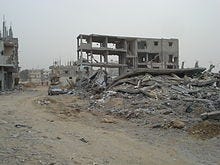While Sanders Calls For US To Be 'Pro-Israel and Pro-Palestinian,' Others Say Netanyahu Makes That Tough
The first order for the world to address is the "grave" crisis in Gaza as a result of the recent attacks
As Palestinians begin to try rebuilding their lives after days of bombardment by Israeli air strikes, policymakers and others in Washington DC are assessing the politics of the recent days of deadly clashes between Israelis and Palestinians which has left Gaza in the midst of a terrible humanitarian crisis.
Secretary of State Antony Blinken described the humanitarian situation in Gaza as “grave,” and the first order of business for the United States and the international community to engage on.
“We’ve got to start to bring countries together to support reconstruction and development. And as we’re doing that, we’ll be re-engaging with the Palestinians, of course, continuing our deep engagement with the Israelis, and trying to put in place conditions that allow us over time hopefully to advance a genuine peace process,” Blinken said. “But that is not the immediate order of business. We have a lot of work to do to get to that point.”
Even as Blinken departs for a trip which this week will take him across the Middle East, to meet with Israeli, Palestinian and other officials, American politicians and other commentators popped up on the Sunday talk shows to assess the politics of the 11 days of deadly skirmishing between Israeli forces and Palestinians which ended with a cease-fire on May 21.

Despite what began as pro-forma statements of support from the Biden administration at the commencement of the violence, it quickly became clear that many among the Democratic Party were worried — and are sympathetic to the plight of — the Palestinian people.
A key area today as it relates to Israel and the Palestinians is one of a generational issue in which younger Democrats have come of age only really knowing one leader of Israel: the hardline, hard-right Benjamin Netanyahu, according to former mayor of Chicago, Democratic congressman and one-time White House chief of staff Rahm Emanuel.
And it has been Netanyahu who has turned support for Israel into a partisan issue, Emanuel added.
“And the younger generation has only known one prime minister in Israel, a person who insulted [then-] Vice President Biden when he came to visit on a settlement start, insulted President Obama by not checking with him about a speech to the Congress, and then fully embraced [former president Donald] Trump,” Emanuel said. “He made Israel a partisan issue.”
Israel is no longer the sympathetic nation it once was, said conservative columnist George Will.
"Progressives like victims. For a long time Israel was David, not Goliath. Now, today, the Palestinians are victims and they're getting the support of — of the sentimentalism about Israel. Mozart and the orange groves and all that stuff has gone away, and it's now a mighty military power with a booming information age economy. It's not as sympathetic as it was,” Will said on This Week. So part of the generational divide that Rahm is talking about is young progressives who feel none of this attachment to Israel —"
“ — and who look upon Israel as someone who's militarily competent, strong, vibrant society, and they kind of resent it next to the Palestinians," Will added.
Meanwhile, Sen Bernie Sanders, the progressive Vermont independent who twice ran for president and recently moved to block US arms sales to Israel due to the recent attacks, said that the United States needs to maintain an “even-handed” approach to the Israeli-Palestinian relationship.
“Look, John, all that I think is that given the incredible suffering in Gaza, where we have a poverty rate of 56 percent, 70 percent of the young people are unemployed, and after the Israeli attacks you have wastewater plants destroyed, clinics destroyed, hospitals destroyed, I think the United States has got to develop a even-handed approach to the Israeli-Palestinian conflict,” Sanders said as a guest on the CBS program Face The Nation. "We have to be pro-Israel, but we have to be pro-Palestinian. And I hope and believe the president understands that. And I was delighted to see that he is moving forward to try to rebuild, with the international community, the destruction — rebuild Gaza after all of that destruction."

